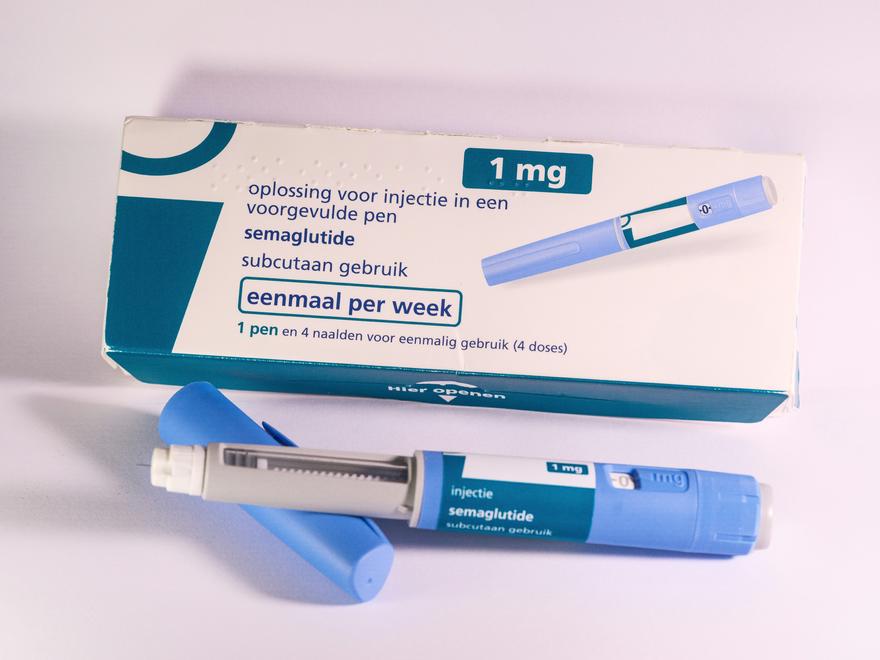Microdosing Ozempic - Are semiglutide injection drugs like Ozempic natural and do they have a place in weight loss?

There is a new trend emerging in the alternative medicine field to prescribe semaglutide drugs like Ozempic in micro doses for inflammatory issues: IBD, autoimmunity, metabolic disease and weight loss, but with allegedly less side effects. This practice is considered “off-label” and frowned upon by conventional medicine.
Proponents of microdosing claim that we shouldn’t be afraid to use these drugs in small doses, since peptides are “just” parts of protein that already exist naturally in our bodies and in food.
In order to determine if this is true we need to understand what natural GLP-1 is?
Natural endogenous GLP-1 is a short-acting hormone that is vital for glucose regulation:
-
naturally produced in the gut
-
stimulates insulin secretion
-
inhibits glucagon release
-
slows gastric emptying
-
promotes satiety (fullness)
Despite the fact that semaglutides like Ozempic were developed based on the idea of a natural peptide, they are classified as drugs because they function differently from the natural peptide.
Calling semaglutides ‘natural’ is misleading, not only because semaglutide drugs are not molecularly bio-identical to endogenous GLP-1, but they are also modified to work differently.
Natural GLP-1 is a hormone made inside the body that has short-lasting effects (short half life of 1.5 - 5 min).
Semaglutides like Ozempic on the other hand are lab made, synthetic & modified to concentrate in the body for long-lasting effects (long half life 165 hours).
Portraying semaglutides like Ozempic to be ‘natural’ undermines the consumer’s ability to make an informed choice.
Long term side effects are still unknown considering that Ozempic was only introduced on the market in 2017 for diabetes and was not prescribed for weight loss until 2021.
So what are the known side effects?
Known side effects of semaglutide (usually temporary, but severity is dose dependant and decreases over time):
-
Nausea, vomiting, diarrhea, constipation, abdominal pain
-
Indigestion, bloating, heartburn, belching
-
Fatigue, headache, dizziness, lightheadedness
-
Injection site reactions (redness, itching, swelling)
There can also be serious side effects that require medical attention, such as:
-
Pancreatitis: severe abdominal pain, nausea, vomiting
-
Thyroid Tumors: medullary thyroid carcinoma (MTC)
-
Kidney Problems: decreased urination, swelling of legs or feet, fatigue
-
Vision Changes: blurred vision or other visual disturbances
-
Severe Allergic Reactions: swelling of the face, lips, tongue, or throat; difficulty breathing or swallowing; severe rash or itching
Emerging concerns:
-
Gallbladder Issues: gallstones and cholecystitis.
-
Ophthalmic Disorders: vision problems have been reported and even blindness
-
Dental Health: dry mouth, gum disease, and "Ozempic teeth" (decay due to gastrointestinal side effects)
-
"Ozempic tongue”: marked by burning sensations and metallic taste
-
"Ozempic face," characterized by sagging skin due to rapid weight loss
Nutrient Depletion
GLP-1 drugs can lead to nutrient deficiencies, because they suppress the appetite and have GI side effects that can reduce both the intake of food and inhibit absorption, due to delayed gastric emptying.
The likelihood of nutrient depletion is likely to be worse in people who already struggle to eat enough (elderly, eating disorders, existing GI issues).
Nutrients of most concern:
1. Vitamin B12
2. Iron, Folate, and Zinc
3. Fat-Soluble Vitamins (A, D, E, K)
4. Protein Deficiency
Lack of protein can lead to muscle wasting (sarcopenia).
As far as using Ozempic at conventional doses just for weight loss, especially without profound changes in diet and lifestyle, the risks probably outweigh the benefits.
Without the complete mindset shift that is required to make permanent diet and lifestyle changes - the weight and the progression of disease returns once the drug is stopped, since none of the conditions that created weight gain in the first place, have been addressed at their root cause.
Are there safer alternatives?
I hypothesize that herbs with similar actions, could be used to prevent having to use the drug in the first place (or to help taper off the drug or down to a microdose and then go off it, with less rebound hunger and weight regain).
Examples of blood sugar balancing and craving reducing herbs that could be used (which one is ideal in your personal situation, depends on your current diagnosis or state of health:
1. Berberine
2. Gymnema sylvestre
3. Fenugreek
4. Bitter Melon
It is important to note though that there could be interactions with herbs - mostly be due to compounding effects on the gastrointestinal tract and overlapping actions such as blood sugar lowering. One should check with their doctor and monitor their blood glucose, if combining herbs with GLP-1 medications.
You can book a session with me here to find out if these herbs are a match to what your body needs.
Is there a place for semaglutides in weight loss?
For people that are stuck in cycle of cravings, overeating and binging, micro-dosing might be a good bridge strategy (it is probably far better than more obtrusive approaches like gastric bypass surgery).
The drug could help some people, just until they get firmly established with permanent diet, lifestyle and mindset changes.
The trouble though, that is if the prescriber of the drug doesn’t also have a complete system of education for diet and lifestyle changes (here’s an example of what that should include), patients are unlikely to make these changes on their own.
It’s not about counting calories, exercising more or following one size fits all dietary strategies.
Health consciousness is the key along with balanced meals based on whole foods and detoxification strategies should be the first step and the foundation - before anything to follow.
Once the foundation is in place, then personalized protocols can be added that include herbs, natural supplements, mindset work and emotional release techniques to overcome weight loss obstacles.
These aforementioned strategies address the combined underlying root causes of being overweight (at the individual level) and ensures that people get healthier on their path to permanent weight loss.
On the other hand, achieving weight loss with drugs and surgery alone, while ignoring nutrition and muscle mass maintenance, can further deplete health, damage the metabolism and cause even more rebound weight gain.
By addressing diet, lifestyle and mindset - before resorting to semaglutide drugs - people are actually more likely to have less side effects and more success with the drug - because the body needs nutritional resources to be able to respond to any and all interventions - natural or not.
Eating nutrient dense foods has the following benefits during weight loss interventions:
-
Fills up people’s nutrient stores, making being on the drug less depleting to the body
-
Less side effects, because drugs are better tolerated by a healthier body
-
Less rebound weight gain and decreased return of old symptoms after they stop the drug
The bottom line is that peptide based drugs are not natural and should be the last resort in weight loss, not the first. At the same time, in some people, micro dosing could be a bridge to better health.
There is no quick fix when it comes to weight loss. Permanent weight loss requires patience. The healthier and more balanced we become, the less cravings we have and over time our weight normalizes as a side benefit of putting health first.
We don’t lose weight to get healthy, we have to get healthy to lose weight.
Want to learn more about how to lose weight naturally without dieting?
Option 1: FREE GUIDE: Get the FREE Diet Myths Guide - https://www.delishdiet.ca/diet-myths
Option 2: E-courses: DIY Natural Weight Loss Bundle - https://www.delishdiet.ca/products/237485-Natural-Weight-Loss-Bundle
Option 3: Book an 'Un-Block Your Weight Loss' private session - https://www.delishdiet.ca/products/178208-Introductory-Session
References:
Microdosing for GLP-1s for Menopause-Related Weight Gain
https://www.joinmidi.com/post/microdosing-glp1
Ozempic History and Approvals
https://www.drugs.com/history/ozempic.html
Semaglutide Molecular Summary
https://pdb101.rcsb.org/global-health/diabetes-mellitus/drugs/incretins/drug/semaglutide/semaglutide
Mayo Clinic – Semaglutide (Subcutaneous Route)
https://www.mayoclinic.org/drugs-supplements/semaglutide-subcutaneous-route/description/drg-20406730
MedlinePlus – Semaglutide Injection
https://medlineplus.gov/druginfo/meds/a618008.html
Understanding GLP-1 Function: A Comprehensive Guide to Its Role in Metabolism and Health
https://bmidoctors.com/understanding-glp-1-function-a-comprehensive-guide-to-its-role-in-metabolism-and-health/
Molecular Pharmacology of Glucagon-Like Peptide 1-Based Therapies in the Management of Type Two Diabetes Mellitus and Obesity
https://pmc.ncbi.nlm.nih.gov/articles/PMC11987703/
Molecular mechanisms of semaglutide and liraglutide as a therapeutic option for obesity
https://pmc.ncbi.nlm.nih.gov/articles/PMC11090168
Pharmacokinetics and Clinical Implications of Semaglutide: A New Glucagon-Like Peptide (GLP)-1 Receptor Agonist
https://pubmed.ncbi.nlm.nih.gov/29915923/
The short half-life of glucagon-like peptide-1 in plasma does not reflect its long-lasting beneficial effects
https://pubmed.ncbi.nlm.nih.gov/12039708/
Ozempic Official Site – Side Effects
https://www.ozempic.com/how-to-take/side-effects.html
Penn Medical Group – Side Effects
https://pennmedicalgroup.com/questions-and-answers/what-are-semaglutide-side-effects
Ro – Side Effects and Management
https://ro.co/weight-loss/semaglutide-side-effects/?
Frontiers in Nutrition (2025)
https://www.frontiersin.org/articles/10.3389/fnut.2025.1566498/full
Nausea and Food Avoidance
https://www.ncbi.nlm.nih.gov/pmc/articles/PMC8067135/
British Journal of Pharmacology (2022)
https://bpspubs.onlinelibrary.wiley.com/doi/full/10.1111/bph.15611
The Daily Telegraph – Vision Issues (Eye Stroke)
What Is 'Ozempic Tongue'?
https://www.verywellhealth.com/ozempic-tongue-11742469
‘Ozempic Face’: What It Is and How To Avoid It
https://health.clevelandclinic.org/ozempic-face
‘Ozempic Teeth’ May Cause Tooth Decay, Other Dental Health Effect
https://www.healthline.com/health-news/ozempic-teeth-may-impact-dental-health
Meta-analysis of the effect and safety of berberine in the treatment of type 2 diabetes mellitus, hyperlipemia and hypertension
https://pubmed.ncbi.nlm.nih.gov/25498346/
Antidiabetic effects of Momordica charantia (bitter melon) and its medicinal potency
https://pmc.ncbi.nlm.nih.gov/articles/PMC4027280/
Comparative Effects of Gymnema sylvestre and Berberine on Adipokines, Body Composition, and Metabolic Parameters in Obese Patients: A Randomized Study
https://pubmed.ncbi.nlm.nih.gov/39064727/
Effect of Fenugreek on Hyperglycemia: A Systematic Review and Meta-Analysis
https://pmc.ncbi.nlm.nih.gov/articles/PMC9962665/
Categories
- Mindset (62)
- Restaurant Reviews (1)
- Skinny Bombs (9)
- Skinny Desserts (7)
- Cleansing for Weight Loss (20)
- Become Certified (11)
- Appetizers (1)
- Weight Loss Blocks (physiological) (14)
- Breakfast (7)
- Case Studies (1)
- Snacks (1)
- Eliminate Excuses (2)
- Medical Weight Loss (1)
- Testimonials (5)
- Weight Loss Physiology (7)
- Weight Wisdom (14)
- Videos (1)
- Recipes (22)
- Group Coaching (1)
- Chocolate (9)
- Chocolate (1)
- metaphysical (1)
- emotional weight (3)
- Emotional Eating (2)
- Cookies (1)
- Condiments (1)

0 comments
Leave a comment